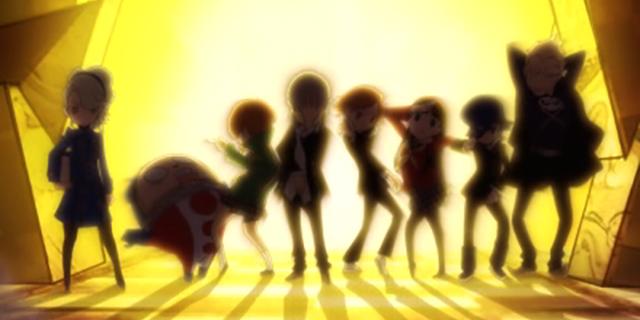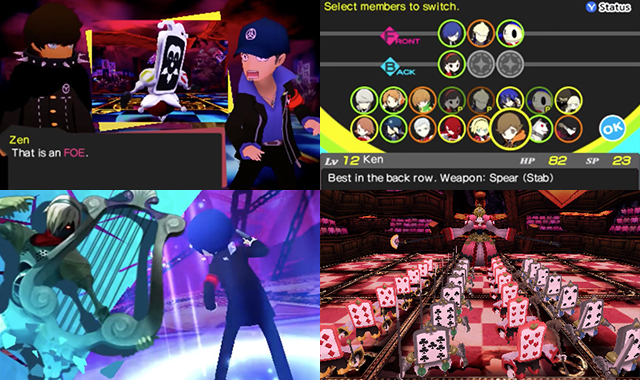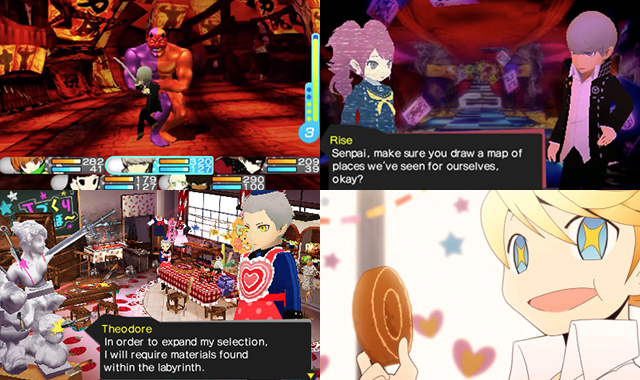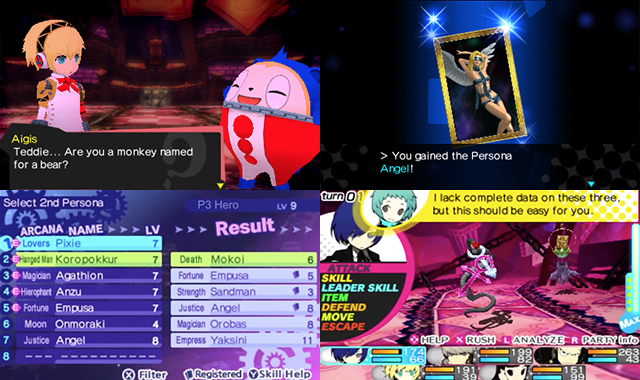
Due to the popularity of the recent Persona games, specifically Persona 3 and 4, we’ve seen a good number of spin-off titles released featuring both casts. If you find yourself interested in these two groups of characters interacting and aren’t particularly fond of fighting games, you’re in luck: Persona Q: Shadow of the Labyrinth is finally here.
Featuring every character you know and love from both titles and gameplay reminiscent of the Etrian Odyssey series, Persona Q seems to appeal only to a very specific audience, but one that will find plenty to keep them busy.
Taking place during both the events of the previous two Persona games, Persona Q follows both groups as they are suddenly transported to an alternate world not unlike their own and forced to navigate a series of bizarre dungeons in order to escape. The story isn’t particularly remarkable, but that’s not the main draw. The interaction between the two casts is, however, and it more than makes up for the lackluster narrative.
Both casts bounce off each other perfectly and it allows for plenty of excellent moments, both serious and comical, that bring out the strengths of each member of group. Best of all, the two new characters, Zen and Rei, feel right at home with the others, even if they initially seem out of place. Originally this was the reason I found myself eager to play more, but it wasn’t long before the dialogue and story dragged down the gameplay with constant interruptions during dungeons, resulting in some parts of the game becoming a chore.

The comparisons to Etrian Odyssey are logical, but this is less like the main games and more like Untold and its focus on delivering a more structured narrative with pre-defined characters. There are plenty of great moments here, especially if you’re plenty familiar with the characters from their original games, but you get a sense that a lot of it is shoe-horned in to give every member of the large cast his or her moments. If you’re not a fan of this dialogue-heavy focus, Persona Q’s constant badgering might irritate.
As you might have deduced from reading this far, gameplay-wise Persona Q is pretty much Etrian Odyssey with Persona characters. You explore multi-floor labyrinths in first-person and run into plenty of random encounters, traps and difficult on-screen baddies known as FOEs. The dungeons themselves are well-designed, complete with environmental puzzles and plenty of shortcuts to speed through areas faster. Despite the deluge of dialogue, you’ll find plenty of reason to explore these sometimes massive and varied environments.
The FOEs, which are seemingly ripped straight out of Etrian Odyssey, are dangerous enemies you stand no chance against during your first journey through a dungeon. Instead of merely having to avoid contact with them, you will be forced to solve a number of FOE-centric puzzles. One you encounter in the first dungeon involves you interacting with certain environmental objects in order to distract them, although it is entirely based on their movement pattern and location when you trigger the distraction. These puzzles have a tendency to be tedious more than rewarding, but they are distinct and allow for some careful planning, which is a welcome change of pace.

Despite the similarities between this and Etrian Odyssey, the battle system is distinctly Persona-like. It’s turn-based, as you might expect, but complete with Personas to summon and weaknesses to exploit. The big difference between Persona Q and the mainline titles is the ability to equip sub-Personas to each character, which is an excellent addition, allowing you to change your strategy without only relying on specific characters.
Typically, the main character is the only one capable of changing Personas, but this time around that ability has been substituted with equipping the Personas you collect and having their health, SP and abilities. These Personas gain experience and new abilities separate from the characters’ main Personas, allowing you to mix and match depending on the situation.
Being able to rely on their HP and SP gives you an added bonus in battle as well. If your healer is complete out of SP, they can still use the SP of their sub-Persona as it replenishes between battles, giving you a slight advantage. You also have the ability to fuse Personas, as you typically expect from a Persona game, providing you plenty of opportunities to customize your party however you see fit. It allows you to utilize your favorite characters in battle without worrying about them being at a disadvantage.
As previously mentioned, exploiting your enemies’ weaknesses also plays a large role in here thanks to the new boost system. Whenever a character uses an attack or spell an enemy is weak against, or does critical damage, that particularly character can use those attacks again without the HP or SP costs associated with them. You can sustain the boost as long as you continue to exploit the weakness and aren’t damaged, giving you a slight advantage in battle and allowing you to conserve SP whenever possible.

Outside of progressing through the dungeons for story purposes, there is a healthy amount of side quests to embark on. Some of these quests are purely based on the interactions between specific characters, but others will have you trekking through specific dungeons to gather materials take on difficult optional bosses. These quests motivated me to explore previously-cleared dungeons, not unlike Persona 4, and gave me opportunities to use my stronger characters to take on enemies I never stood a chance against prior, such as the menacing FOEs.
Persona Q also continues the recent trend in Atlus games to allowing for more newcomer-friendly difficulty options. You can play as you typically would or even bump up the difficulty to the hardest setting if you consider yourself a masochist, but those just getting their feet wet will feel welcome here. This has always been a positive trend for Atlus’ releases and it’s a perfect fit here, especially since many Persona fans might be unfamiliar with more traditional dungeon-crawlers.
Whether or not you consider yourself a dungeon-crawler veteran or simply a fan of Persona, Persona Q has a lot to offer. It manages to meld the gameplay of Persona and Etrian Odyssey perfectly, and is complete with a good number of well-crafted dungeons and excellent new mechanics. It may be a little dialogue-heavy, which is either a positive or a negative depending on what you’re looking for, but it’s a solid RPG that will undoubtedly keep those hungry for a new handheld title busy for many weeks.
Pros: Brings together Persona and Etrian Odyssey in an exciting way, customizable difficulty settings for newcomers
Cons: Tends to be a little too dialogue-heavy at times



















